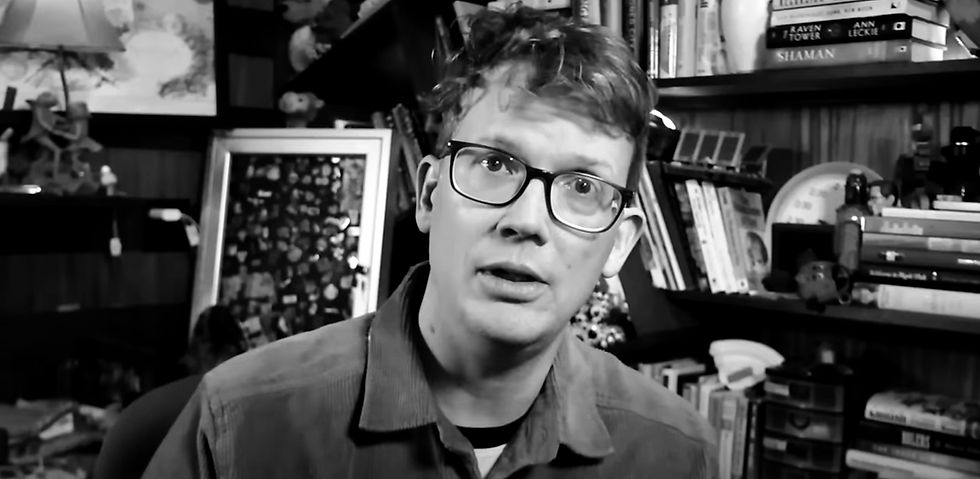hank green & comfort politics
- sputnik sweetheart

- Apr 23, 2025
- 3 min read

A few days ago, Hank Green uploaded a video titled "The Palestinian Buddhist Arrested by ICE," which sought to address the unlawful detainment of Mohsen Mahdawi, a Palestinian activist at Columbia University. It features an interview with Mohsen's Israeli-American friend and fellow Columbia student, Mikey Baratz. The conversation emphasizes the necessity of open dialogue as a means of moving towards peace and democracy.
But something about this video didn’t sit right with me. Actually, a lot didn’t.
Dialogue Without Balance
The video touches briefly—barely—on the illegal arrest of Mohsen Mahdawi. That’s already a red flag. His forced removal isn’t the centerpiece of the discussion; it’s treated like a footnote. Instead, the video pivots to Mikey’s personal views and experience with the Israeli-Palestinian conflict.
It’s telling that the conversation features two white liberal men and no Palestinian voices. The irony of talking about the need for dialogue and inclusion while excluding the most directly affected is staggering. Instead, the Palestinian experience is kept comfortably at arm's length.
But avoiding discomfort is not a virtue—it's a privilege. It’s comfort politics: the liberal fantasy that we can address such topics without touching the messy, urgent discomfort of colonialism, racism, and genocide.
Mahdawi as the "Perfect Victim"
Whenever Mohsen is mentioned, it’s in the context of his virtuous character and remarkable empathy. The title even makes sure to note that he is Buddhist. Mikey exclaims, “This is the guy!”—as if Mohsen’s value lies in how well he fits a perfect, non-threatening mold.
The praise he receives often places him in direct contrast to “other” Palestinians. He’s not a “violent Muslim,” but a “pacifist Buddhist.” He’s respected for being empathetic and willing to listen to the people who represent his oppression. This feels like textbook “perfect victim” framing—palatable, safe, easy to sympathize with. But why must we only humanize the oppressed when they reflect the desired values of the oppressor?
What if the subject had been a Muslim man? Someone more outspoken, angry, or grieving? Would the same empathy be extended?
The Enlightened Centrist
Centrism is often mistaken for nuance, but in this context, it reads as evasive. The video promotes a kind of “both-sides-ism” under the abstract banner of coexistence, even in the face of very real, very violent occupation. Instead of any acknowledgement of the systematic powers at play, we get "hummus diplomacy" and a casual “Inshallah, as they say,” tossed in at the end—phrases that feel like punchlines in a video that avoids naming Islamophobia or Zionism with any real clarity.
It’s not just tone-deaf—it’s dehumanizing.
The video tries so hard not to offend that it ends up softening the reality of state violence and occupation. At its best, it gives off white savior vibes. At its worst, it feels like a deliberate attempt to soften the blow of oppression for a liberal white audience. Euphemism after euphemism, the situation in Gaza and the occupied territories is made more comfortable, more digestible, and therefore easier to dismiss.
Let’s be clear: the middle ground between genocide and peace is genocide.
Conclusions
I’ve admired Hank Green’s work for years. I truly appreciate the thoughtful, educational space he’s built online. I can also understand that this video was made quickly—Mohsen’s arrest was announced on the 14th, and the video came out just four days later. And I get that Hank isn’t an expert in Middle Eastern politics.
But here’s the thing: you don’t have to be an expert to know right from wrong.
We’re living in a time when fascism is at our front door, when Democrats are on the back foot, and liberal creators are congratulating themselves for “starting conversations” that ultimately go nowhere.
Productive conversation has to be grounded in fact-checking. It has to include Palestinian voices. It has to center the real victims, not reduce their stories to palatable, centrist narratives.
I am critiquing Hank Green here not to shut down the conversation, but to actually start one.
– sputnik sweetheart ⋆˙⟡♡






Comments